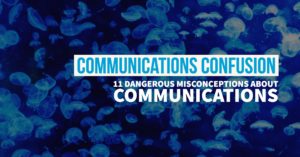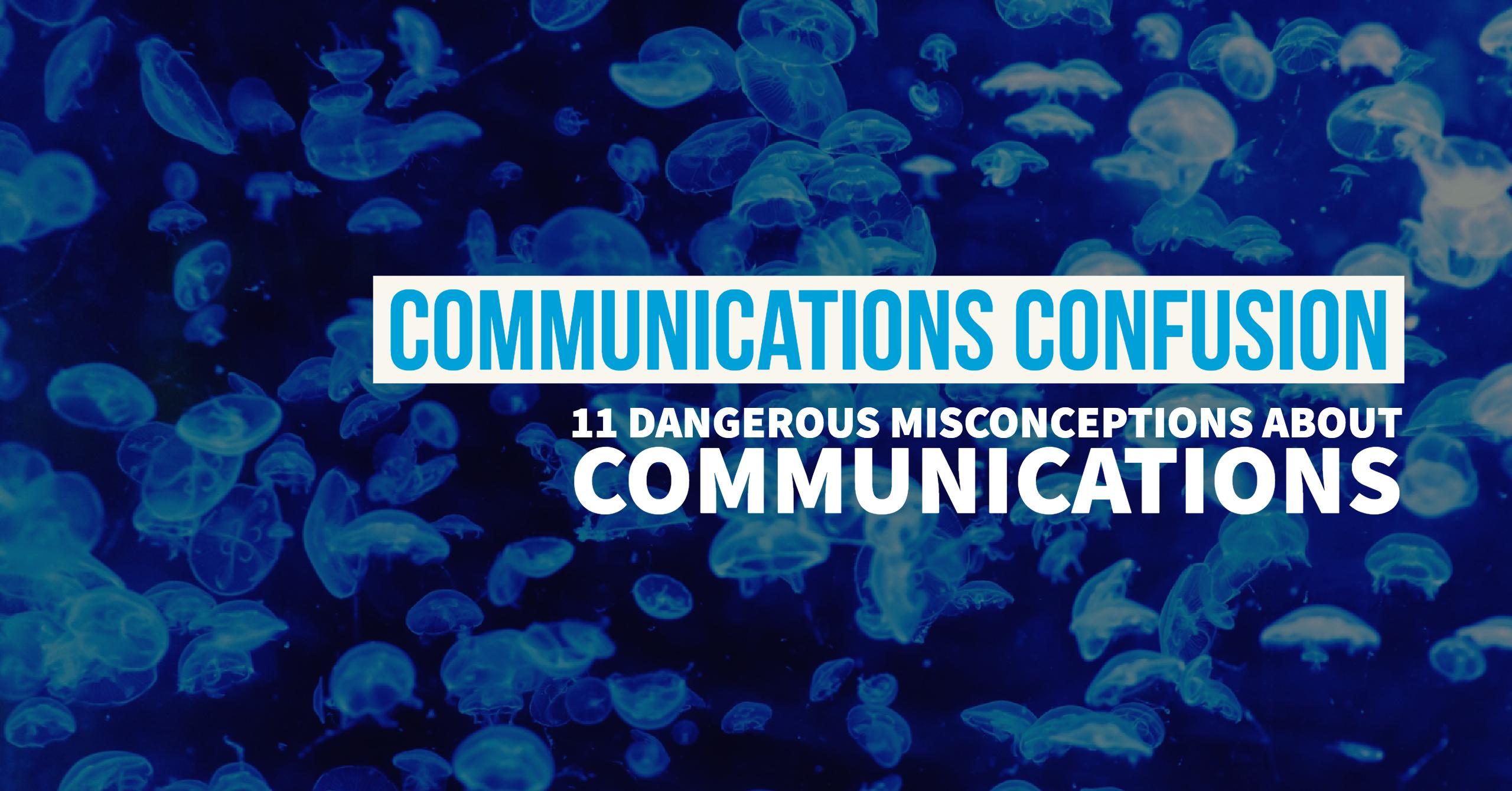
Communications is as necessary to our survival as breathing. It’s how we engage and interpret our world. We label and reference what we see hear and smell and then use that information to share ideas, solve problems and fire imaginations. Despite the integral role it plays in helping us to navigate our lives we often take effective communication for granted. We assume that everyone is seeing the world through our eyes and experiences. This can lead to misinterpretations, disagreements, and confusion.
Misconceptions can shape how we see and understand messages. They can inform decisions and drive objectives. While errors in understanding can sometimes be funny, too often the results are far from humorous. If you are in business then you are in the field of communications. Without the proper care, you and your brand can be felled by misinterpretation.
The following are some of the most common misperceptions I have encountered working in business communications.
- Communication happens when messages are sent. Sometimes people assume that because they have sent a message, that it has been received or that receiving a message is the same as understanding it. Consider how many messages are sitting in your inbox unopened or all of the promotional mail that goes directly into recycling. Most messages never get to their intended audience. Assume communications has happened when you hear an answer or see an outcome that confirms it. This is especially true when it comes to social media. Thousands of posts don’t mean thousands of views, much less that people have understood or engaged with your content.
- Fluency means comprehension. This misconception is related to the idea that your proficiency in a language is somehow a measure of your effectiveness in communicating. If that were true, then someone with a large vocabulary need not listen, ensure that messages were actually heard, understood or retained. If you have ever read an academic paper you know that a deep understanding of a topic is no assurance of the ability to communicate about it effectively. Unfortunately, having a deep understanding of a particular topic can actually result in lowering your ability to communicate about it well. One reason this happens is that you can get into the habit of using the jargon or abbreviations that are well known to those in the field but become a barrier to those outside of it.
- If people don’t agree with you, then they misunderstood. Overconfidence in the truth or righteousness of your message can sometimes result in an assumption that everyone will agree with you. The belief that your message is the only message can be a reflection of your commitment to an idea or your passion for a cause. Think about how often political convictions can result in disputes amongst friends. Sometimes people hear your message just fine but they simply don’t agree with you. This is not necessarily a prompt to restate, repeat or say it louder. It can be a prompt to rethink.
- You can’t plan for crisis communications. As a business, not having a crisis communications plan is a strategic blind spot that can result in a hard and fast fall. Consider conducting a vulnerability audit. If you are a small business or operating on your own, ask yourself questions related to worst-case scenarios. What would need to be in place if you got sick? What do you need to do if your regular suppliers are unavailable? Who do you need to train if they need to take over? Are there processes you should be documenting? Do you have an emergency contact list? If you have a larger business, ask people responsible for various departments to consider potential weak spots and plan for worst-case scenarios. Do you have a communication tree set up so that messages can quickly reach multiple people? Make sure that your response process is efficient. Slow responses in times of crisis can grow the crisis.
- Always stay positive. Optimism is awesome, its good for you and practising optimism is important to success. However, while having a positive and happy brand has become the default for many organizations, sometimes you have to disagree with people or take a stand on a topic that affects or offends a large segment of your market. Avoiding conflict or negative conversations can actually result in tarnishing your brand or hindering innovation. Innovation often requires taking risks and risks can result in negative outcomes. Employees need to feel comfortable enough to take chances. Risk can be the difference between making the mediocre good and the good great.
- One message fits all. If all humans had identical needs, experiences, and aspirations, perhaps one type of communication would be feasible. Since we have unique needs or at least groups of people have unique needs, then we have to tailor communications to match our various audiences. Not only do people learn and understand things in different ways, they have different expectations and priorities. By keeping communication styles responsive and flexible you will be better at getting your message delivered.
- Any problem can be resolved with effective communications. Communications is not magic. There are some challenges that communications simply will not overcome. In some situations, the best that communications can do is facilitate interpersonal exchanges and help to make the position of both sides clear.
- The more communications the better. Whether you are talking about interpersonal communications or the media more is not necessarily better. If you want press coverage sending countless press releases may only result in reporters learning to ignore your messages. Being stingy with knowledge is rarely a good idea if you are trying to influence an outcome, but as with most things, balance is important. Measure your responses, take the temperature of your audience to determine if your message is getting through.
- Good logic makes for good communications. This misconception assumes that emotions play no role in communications. The reality is that you can get different reactions to the identical message depending on how it’s delivered when it’s delivered, and how you and the recipient are feeling at the time of delivery. Think about how effective it is sending a “get to work” message late Friday afternoon in the summer.
- Ignore social media in a crisis. It’s hard to believe that anyone still thinks they can ignore social media during a crisis, but every year organizations that should know better do. Not only do you have to engage on social media during a crisis, you have to do so quickly or risk having your brand negatively affected. Being responsive means having a clear policy in place letting employees know what they can and cannot respond to in case of a crisis. It also means being available to respond after hours.
- Communications is easy. Just because everyone does it doesn’t mean they do it well. While most people can learn to be better communicators with time and practice, good communications take work. Communicating effectively with broad and diverse audiences requires research, skill, and knowledge.
Related Articles:

These are great tips Debra. Communication should be straight forward but it rarely is. We each have a different way of absorbing information and relaying information which is dependent on the home environment we grew up in, our personality and the actual situation. We are a complex people therefore one rule cannot work for us all. Methods of communication can be developed as what worked for an organisation ten years ago may not work so well today.
Great point Phoenicia about how effective communications methods can become obsolete over time. Ten years ago large organizations were all racing to build intranets for their employees to communicate with each other, now they are finding that no one uses them. It’s important that we continually look at ways to improve our communications
Interesting post, Debra. I connect with your first point most strongly. In today’s world, so many e-mails are not rec’d by the intended recipient. We all have to be fully aware of that, and follow-up before we take further action.
When I worked in external relations I saw more chaos come from e-mail than any other single source. It’s a powerful communications vehicle that we often take for granted.
I’m always amused when I meet writers who bemoan sharing their work in critique groups and get frustrated when their writing gets picked apart and say the other end just doesn’t understand what they are trying to get across. It’s easy to forget that communication is a two-way street. It’s always a great idea to ask for and receive clarification.
I’ve always wondered why someone would write for themselves if they wanted to sell books. I guess its like singing in the shower… with an audience?
It’s not intended as a pun when I state: Well said, Debra. I can be a fairly funny person, but boy there are times when my humor falls totally flat. I realize quickly that I have to re-group and approach that person differently. When I worked in HR in corporate, I learned very rapidly to craft emails to upper management as if they were fifth graders—short, simple words and bulleted or numbered–otherwise I lost them before I could make my point!
RoseMary as someone who has laughed out loud in the middle of a tense meeting, I get the humour perspective. I’ve also had some of the strangest reactions to emails so I’ve learned to assume nothing and adopt the KISS (keep it simple stupid) principle when writing them. 🙂
There are over seven billion people in the world that perceive the world in different ways. So when you communicate it helps to keep it simple/stupid to at lease try to avoid misunderstandings. If it’s busines it’s a good idea to follow up to make sure you were not misunderstood. If you are communicating with someone from a different culture with different values it becomes even more complicated. Communicating is actually a risk you have to take because otherwise you are doomed. Don’t put anything in writing about a subject you don’t understand 100% because it could be fatal. The minimum you can expect if you are mad enough to write about issues you don’t understand is, to put it in a nice way, that you will be considered ignorant.
I love this statement, “The minimum you can expect if you are mad enough to write about issues you don’t understand is, to put it in a nice way, that you will be considered ignorant.” It sums it up nicely. 🙂